Longtime Warrior’s Journey Is a Labor of Love
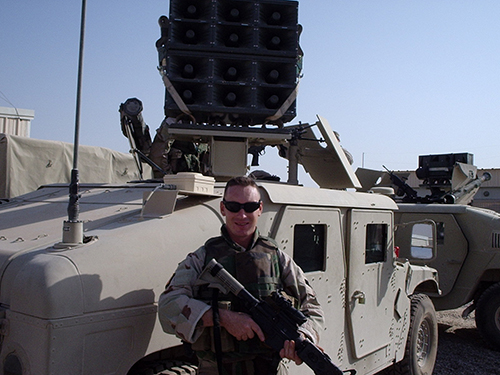
Brian Neuman served the country in the Army and was one of Wounded Warrior Project’s earliest warriors. Now, he helps serve injured veterans as part of WWP’s 20-year-long mission to honor and empower wounded warriors.
Serving in the U.S. military was beyond life-changing for Brian Neuman. It’s how he lost his arm. It’s how he died for two minutes on an operating table. It’s how he found his future career. It’s how he found love.
Being in the military put him on a winding path, but it all led to personal and professional fulfillment.
Brian almost lost his life in Iraq 19 years ago. While recovering from his combat injuries, he was introduced to Wounded Warrior Project® (WWP). Beginning in 2003, WWP started providing support and comfort to wounded service members returning from Iraq and Afghanistan with backpacks filled with personal care items.
Brian was one of WWP’s earliest warriors to receive that backpack– and one of its first employees. Twenty years later, WWP has grown to serve more than 200,000 post-9/11 veterans and family members and is always evolving to meet their needs.
Donors, supporters, and the thousands of warriors are who make “20 Years of Possible” and who help prepare WWP for the next 20 years.
Here is Brian's story, spanning more than 20 years of service and his longtime journey with WWP.
For the Love of Service, and a Fellow Service Member
In 1991, after Brian graduated high school, he knew he wasn’t quite ready to go to college. He enlisted in the U.S. Army and served in the infantry as an Army Ranger.
When he got out of the Army, he joined the Massachusetts National Guard. Although he already had a history of military service, his sense of patriotic duty was intensified by tragedy. Like many service members who deployed to Afghanistan and Iraq, Brian was motivated to do something in the wake of the Sept. 11 attacks.
“I had been out of the military for about five or six years when 9/11 happened,” Brian said. “I still missed the military, but it never crossed my mind [to go back in] until that day.”
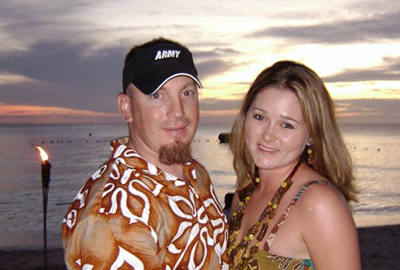
Brian was 30 years old and had the experience from his previous time in service, but it had been more than five years since he’d gotten out, so it was like starting over. He wasn’t able to retain his rank and had to go through basic training again. Rather than go back into the infantry, Brian chose to serve the Army in psychological operations (PSYOP). He was sent to Fort Liberty, North Carolina, where he would meet the love of his life.
“She was completely and utterly different than me. She was kind of a terrible soldier, I think,” Brian joked.
Erika Lazos was 24 and already had her master's degree when she joined the Army Reserves.
“She was dead set on not dating anyone in the military, and obviously that didn't work out too well for her,” Brian said.
Erika finished advanced individual training (AIT) and ultimately took a teaching job in Raleigh, North Carolina, to be closer to Brian. A few days before she was set to start work, Erika found out she was being assigned to a Psych Ops unit and would be sent to Iraq.
“Here I am at Arabic language school for the next six months, and my girlfriend is deploying to war,” Brian said.
As we know now, the war in Iraq would last for more than seven years, but, at the time, Brian thought it would be over by the time he finished training.
“I graduated language school in August, and I end up going to the psychological operations attachment that supports the Ranger regiment,” Brian said. “Lo and behold, I'm there for two months and I get a phone call at 4 a.m. that they're putting the 1st and 2nd Ranger Battalion back into Afghanistan. So, I deployed to Afghanistan while Erica was in Iraq.”
Erika returned home, but the distance apart caused the couple to break up. Because he was single, Brian volunteered for another rotation in Afghanistan, and another in Iraq. This last deployment would change Brian’s life forever.
Brian knew the dangers he was surrounded by in Iraq. He told his leadership that if anything happened to him, he really only wanted two things.
“If I die in combat, I want to be buried at Arlington. My family may try to argue that, but that's my wish,” Brian told them. “And secondly, if anything happens to me, call this girl.”
On Veterans Day, Nov. 11, 2004, the vehicle Brian was in hit a warhead that penetrated the vehicle’s armor. It killed the interpreter who was next to him and ripped off Brian’s left arm.
The day after his injury, Brian woke up in a field hospital waiting to be airlifted to Germany. His commander was there to thank him and asked Brian if he wanted Erika to be called. Brian decided that was a call he should make himself when he got back to the U.S.
Returning Home and Finding Hope
Brian was transferred to Walter Reed National Military Medical Center to begin treatment. He was rehabilitating his physical injuries, but for the first few weeks back in the States, it was the emotional turmoil that was causing him the most pain.
“My world was completely changed,” Brian said. “For the first couple of weeks, I had this intense feeling of guilt because I was alive, and I was going to live, and I was safe, and my team didn't get a chance to take a break. They were right back in the city (Fallujah) the next day, and I couldn't be with them. I couldn't help them.”
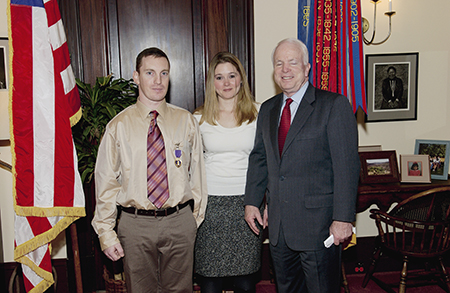
To make matters worse, when Brian arrived at Walter Reed, he didn’t have much. “I had nothing,” Brian said. “The only thing that made it back to the States was me.”
Then one day, a Special Operations Command liaison at the hospital delivered a WWP backpack to him. Brian
had no idea how big a role that moment would play in his life.
“I didn't have any idea who Wounded Warrior Project was, but I loved the logo.”
Brian also built up the strength to reach out to Erika. He sent her an email from the hospital letting her know he was in the U.S. and had gotten a “little banged up” in Iraq. They spoke that evening, and she was at Walter Reed less than 48 hours later.
As fate would have it, the Department of Veterans Affairs (VA) had recently opened the only other military treatment facility for amputees and burn victims in San Antonio, the same city Erika lived in.
“I got [to San Antonio] in February of 2005, proposed to her in May, and then we got married the following May,” Brian said.
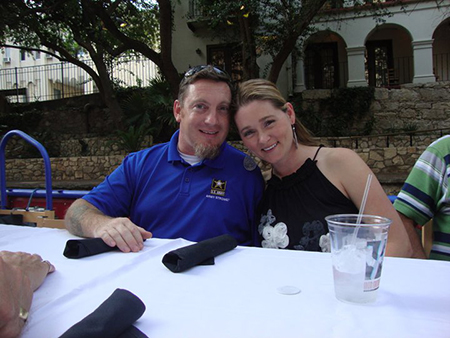
Finding Fulfillment
Moving to San Antonio, marrying Erika, and starting a family brought Brian both personal and professional fulfillment. He was a registered warrior with WWP and understood the impact they had on him when he was struggling.
“I thought if I can't go back into the military and I can't deploy again, I probably want to be involved in the veteran space,” Brian said. “I knew that if the organization grew, they were probably going to be looking to hire someone in San Antonio because there were lots of warriors here.”
Brian was right. His experience as one of WWP’s earliest warriors and his passion for serving led to a position at WWP and the opportunity to help wounded veterans like himself.
In his time with WWP as a warrior and an employee, he’s got to see the organization grow and change and serve more and more warriors and their families.
“It’s been awesome to see the growth,” Brian said.
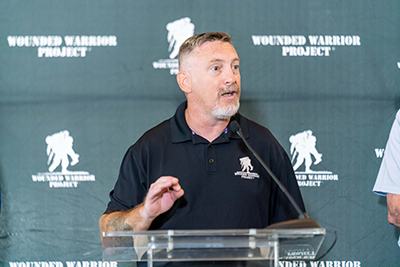
Brian is a testament to WWP’s mission and goals over the last 20 years. While backpacks for injured service members are still a staple, WWP offers free programs and services in mental health and wellness, physical health, financial education, and long-term support.
“It’s an incredible myriad of programs that we offer, free of charge,” Brian said. “We’ll continue to address the needs of different generations of veterans. The people who got hurt 20 years ago have different needs, different desires, and different goals than the ones who are getting hurt today and may not even have been alive when 9/11 happened. We're trying to address generational gaps and needs.”
Brian’s future hopes for WWP may come as a surprise, though.
“I hope to see a day when Wounded Warrior Project isn't needed,” Brian said. “That is when we reach our goal, to have the most well-adjusted generation of veterans in this country's history. If we ever did reach that, it would be great, because that's what we all want. Right?”
Contact: — Paris Moulden, Public Relations, pmoulden@woundedwarriorproject.org, 904.570.7910
About Wounded Warrior Project
Since 2003, Wounded Warrior Project® (WWP) has been meeting the growing needs of warriors, their families, and caregivers — helping them achieve their highest ambition. Learn more.